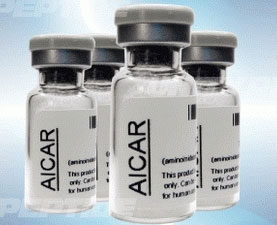'TV enthusiasts' can stop death
According to a new study published Jan. 8, a drug discovered nearly four years ago to help muscle in lazy mice may also work to prevent sudden death from heat.

The authors of the study said that if the tests went well, the new drug could help athletes or soldiers with temperature sensitivity avoid losing their lives because of overwork. a hot day.
In 2009, the drug known as AICAR was given the nickname "drug for TV enthusiasts" after it was found to create muscle and increase endurance in mice that were completely unmotivated in the lab. experience. Now it is found that this medicine also works to treat some muscle-related diseases and digestive disorders.
In a paper published in the Journal of Natural Medicine, US researchers said that they happened to find that AICAR also helps mice fight a disorder called malignant hyperthermia due to muscle tension.
This dangerous condition is related to defects in the genome called RYR1 , which exists in mice and humans. It occurs when body heat builds a calcium leak in muscle cells. The greater the amount of calcium will gradually contact with muscles, causing muscle failure. Potassium and protein excreted from muscle cells have been beaten, which in turn will spill into the bloodstream, to a high toxic threshold that damages the heart or kidneys.
Tests on genetically engineered mice to carry the RYR1 gene variant revealed that AICAR works perfectly in preventing this phenomenon.
"When we put AICAR in the mouse less than 10 minutes before the operation took place, it was 100% effective in preventing deaths caused by the big heat" - cell physiology professor Susan Hamilton Baylor Medical School, Texas, said.
AICAR - the full name is 5-aminoimidazole-4-carboxamide ribonucleoside - works by blocking calcium leaks in cells, thereby preventing malignant hyperthermia.
This finding may someday help create a sudden suppressive drug for young athletes who are sensitive to heat, or soldiers who fight in the desert with heavy fighting equipment.
Abnormal mutations in the RYR1 gene are expected to occur in every 3,000 people.
But researchers believe the drug is also effective for people without the RYR1 defect.
"We think the basic process occurs while an individual with a RYR1 mutation with malignant hyperthermia will resemble what happens in the human body without the mutant gene" - Robert Dirksen, teacher The pharmacist at the Medical Center of the University of Rochester in New York said.
"The difference may be that individuals with RYR1 variants will be more susceptible to hyperthermia, while those without defective genes will need more impact, such as they suffer. Large heat for a longer time, to reach the threshold of activation of the dangerous state ".
- What is brain death?
- Infant death due to gene disorder?
- People are aware that they have just died?
- Fashion watches for fitness enthusiasts
- Video: The reason why things cannot revive after death
- Mysterious 'strange disease' caused time to stop
- What happens when people stop sneezing?
- Discovered the Buddha statue on Mars
- Doctors from California, USA share clips to help children stop crying in a heartbeat
- Looking for the norm for
- What are the feelings about 10 seconds before death?
- The most frightening deaths in the world
 Green tea cleans teeth better than mouthwash?
Green tea cleans teeth better than mouthwash? Death kiss: This is why you should not let anyone kiss your baby's lips
Death kiss: This is why you should not let anyone kiss your baby's lips What is salmonellosis?
What is salmonellosis? Caution should be exercised when using aloe vera through eating and drinking
Caution should be exercised when using aloe vera through eating and drinking